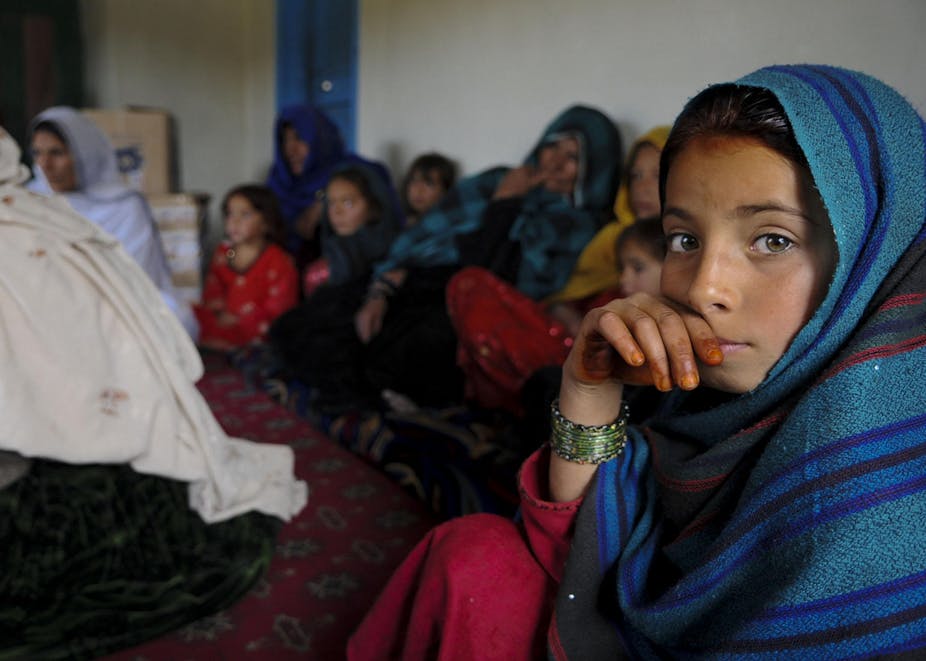A revised Criminal Procedure Code currently sits on the desk of Hamid Karzai. It has already passed through both the lower and upper houses of the Afghan parliament. If President Karzai signs it into law the legal protection of women in Afghanistan will suffer a major blow.
Article 26 of this new code, entitled “Prohibition of Questioning an Individual as a Witness”, started out as an effort to stop defendants being forced to testify against family members who had abused them. During debate of the draft code in the Afghan Parliament this precautionary article was transformed. It now bans the family members of an accused person testifying against them. It also prohibits medical professionals from giving evidence in such cases.
If ratified, Article 26 would severely hamper the prosecution of domestic and sexual violence cases committed against Afghan women and girls. Afghanistan is a country that suffers from a relatively high incidence of child marriage, “honour” killings and the exchange of girls to resolve disputes between families. Given this and the fact that domestic and sexual violence is most often committed by family members, the revised code would make prosecution of such cases near impossible.
For example, Afghan women and girls would be unable to offer testimony in cases in which they experienced violence or “forced” marriage at the hands of family members. Fathers, mothers, siblings and extended family members – often the only witnesses to physical, sexual and psychological violence – would be unable to give evidence in domestic violence cases.
If this were to happen it is also likely that there would be a shift in the perceived effectiveness of Afghan courts. A move away from the formal justice system toward more traditional judicial mechanisms, could be expected.
Hard-won gains
The informal legal system in Afghanistan is largely unregulated and most commonly takes the form of ad hoc consultations between village elders and prominent figures in the community. Meetings of this type tend to favour men over women, the old over the young, and the rich and powerful over the marginalised. A shift back toward such a system would signify a major setback in the legal gains made in Afghanistan since 2001.
The timing of the planned revisions to the Criminal Procedure Code is also important. While violence against women is common in Afghanistan (it was estimated, in 2008, that 87% of Afghan women suffer some form of violence over the course of their lives), important gains have been made with respect to the legal protection afforded to women since 2001.
These include the growing provision of legal aid to Afghan women (and men), the widespread promotion of women’s rights by institutions such as the Afghan Independent Human Rights Commission, the endorsement of the Elimination of Violence Against Women (EVAW) Law in 2009, and the recent founding of dedicated EVAW prosecution offices across the country. The EVAW Law itself established new penalties for child marriage, “forced” marriage, domestic violence, rape, the sale of women and girls, and their exchange for the purposes of dispute resolution.
These efforts have translated into Afghan women gaining confidence in the ability of the legal system to protect them. According to the United Nations Assistance Mission to Afghanistan, the reporting of cases of violence against women has risen 28% in Afghanistan in the past year. It is in response to this rising tide of women’s empowerment that Article 26 of the revised Criminal Procedure Code was penned.
Losing ground
Yet, this is not the only incident in which efforts have been made by the Afghan Parliament to undermine gains made in the protection of women’s rights in the past year. Human Rights Watch (HRW) has catalogued a list of attempts to weaken legal protections for women. This includes an attempt in May 2013 to repeal the EVAW Law through parliamentary debate, a parliament-sanctioned reduction in the number of seats allocated to women in provincial councils in July 2013, and an attempt by the Afghan parliament in November 2013 to reinstate execution by stoning as the punishment for adultery. HRW see this series of events as an continuing effort to limit hard-won protections for women and girls in Afghanistan.
In many ways these events are a sign of the times. They reflect the growing uncertainty surrounding the presence of US forces in Afghanistan after 2014. Increasingly President Karzai has distanced himself from his American counterpart Barack Obama. In the face of widespread domestic consent, he has refused to sign a bilateral security agreement with the US. Instead, he has sought to keep his options open. In an attempt to strengthen his position in a post-NATO Afghanistan he has sought to engage the Taliban and has begun to pander to more conservative elements in Afghan society.
This uncertainty has galvanised those opposed to the formal justice system and the empowerment of women. It has also contributed to an environment in which legal protections for women can be more openly challenged. More importantly, however, it will also have a bearing on whether President Karzai chooses to either endorse or throw out the draft code that sits upon his desk.

